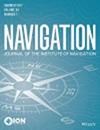Perspectives on the Systematic (Type B) Uncertainties of UTC-UTC(k)
IF 2
3区 地球科学
Q1 ENGINEERING, AEROSPACE
引用次数: 1
Abstract
The systematic uncertainties in the difference between Coordinated Universal Time (UTC) and UTC realizations like UTC(k) are analyzed with a semi-historical algorithm using the uncertainties of the calibrations of only the extant time-transfer links and their covariance with clock predictions. It is important that the network has matured through recalibration, and that UTC was once generated with only GPS. This approach covers all types of links, including redundant links and cross links. The uncertainties of non-GPS links depend on the uncertainties of the pivot lab’s GPS system and the other system(s) used in the link. Clock predictions of labs not linked by GPS must be adjusted whenever the pivot lab’s GPS receiver is recalibrated. The resulting uncertainties differ by up to 45% from the results given in a recently published alternative proposal. Aging of the uncertainties leads to a blending of this approach with the current algorithm used by the International Bureau of Weights and Measures (BIPM).UTC-UTC(k)系统(B类)不确定度的展望
摘要采用半历史算法分析了协调世界时(UTC)与UTC实现(如UTC(k))之间差异的系统不确定性,该算法仅利用现有时间传递链路的校准不确定性及其与时钟预测的协方差。重要的是,通过重新校准网络已经成熟,并且UTC曾经仅由GPS生成。这种方法涵盖了所有类型的链接,包括冗余链接和交叉链接。非GPS链路的不确定性取决于支点实验室的GPS系统和链路中使用的其他系统的不确定性。没有GPS连接的实验室的时钟预测必须在中心实验室的GPS接收器重新校准时进行调整。由此产生的不确定性与最近公布的替代方案中给出的结果相差高达45%。不确定性的老化导致该方法与目前国际计量局(BIPM)使用的算法混合。
本文章由计算机程序翻译,如有差异,请以英文原文为准。
求助全文
约1分钟内获得全文
求助全文
来源期刊

Navigation-Journal of the Institute of Navigation
ENGINEERING, AEROSPACE-REMOTE SENSING
CiteScore
5.60
自引率
13.60%
发文量
31
期刊介绍:
NAVIGATION is a quarterly journal published by The Institute of Navigation. The journal publishes original, peer-reviewed articles on all areas related to the science, engineering and art of Positioning, Navigation and Timing (PNT) covering land (including indoor use), sea, air and space applications. PNT technologies of interest encompass navigation satellite systems (both global and regional), inertial navigation, electro-optical systems including LiDAR and imaging sensors, and radio-frequency ranging and timing systems, including those using signals of opportunity from communication systems and other non-traditional PNT sources. Articles about PNT algorithms and methods, such as for error characterization and mitigation, integrity analysis, PNT signal processing and multi-sensor integration, are welcome. The journal also accepts articles on non-traditional applications of PNT systems, including remote sensing of the Earth’s surface or atmosphere, as well as selected historical and survey articles.
 求助内容:
求助内容: 应助结果提醒方式:
应助结果提醒方式:


